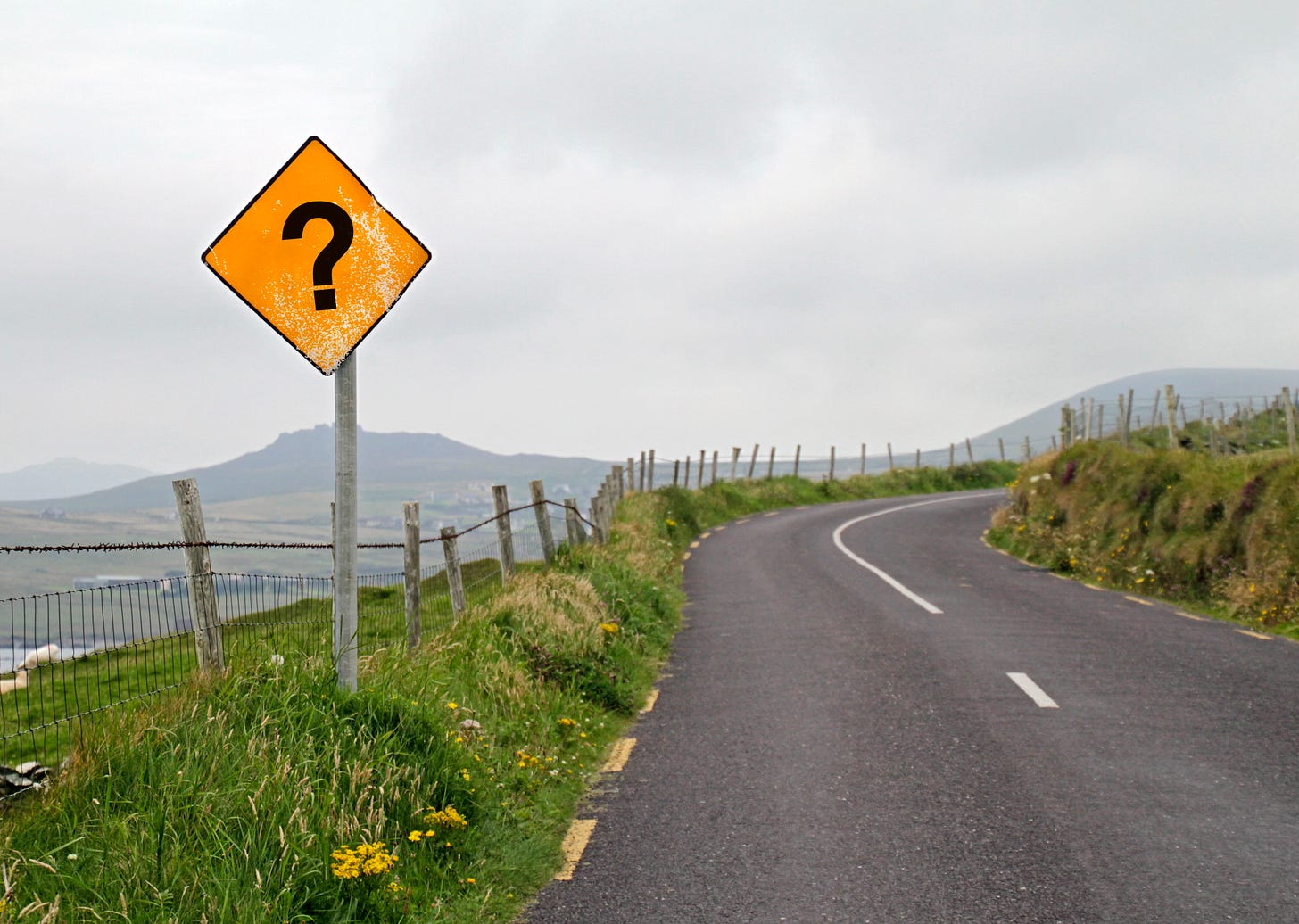My career in the rear view mirror
looking back on the rules that kept me going
Retiring from my career was like stepping off at the station after a 42-year bus ride. The first big question was “Where am I?” I was in a suburb I recognized, but I was suddenly faced with the most discretionary time I had had since I was four.
Think about it: once I entered “the school system” through those big red doors of Elliot House where I went to kindergarten in Wilmington, Delaware, my year was carefully circumscribed. Summer vacations were three months, typically from the beginning of June until after Labor Day — a reliable expanse of time each year for the next thirteen years. But after graduating from high school, I had a summer job each year, nine to five. Same pattern through college. I was either in school or working — with the notable exception of my sophomore year when I spent the entire summer rewriting my Henry James paper, and learned that the task expands to fit the time available.
Consecutive weeks of unstructured time shrunk to two or three weeks around the holidays. Over the course of my career it shrank again to ten days of PTO (Paid Time Off).
Basically it has been six decades since I have had this many months of unstructured time. I love where I am, even if at times it feels strange to be so unaccountable.
Which brings me to my second big question: “What sustained me for the four decade bus ride?” I wish I could say “I was passionate about what I did each day, trying to make the world a better place” but that would be misleading. More precise would be that I worked to earn a living and to fulfill an obligation. Which, as I write this, sounds like what my own father might have said.
Some of my dad’s generation were known to spend their entire career in one company. In the case of Wilmington, that company was Du Pont. Boomers like me followed similar paths, but changed jobs more often than our fathers did.. Our children, the Millennials, began the search for — and increasingly demand — work-life balance. We Boomers initially said “Work-life balance?? We never had that!” but then we started writing articles about it as though it was there all along. Now comes Gen-Z looking for work that aligns with their values and offers flexibility. We never had that, either!
Gen-Zers probably won’t even WANT to get on the bus I got on. Or is that even an option? What changed? Why did I feel like I had to ride so long in a series of 9-to-5 jobs? Filling out timesheets? Ironing five shirts every Sunday night? Taking only 10 days off a year?
One answer is… healthcare. A few decades after WWII, employer-sponsored insurance became the dominant model for healthcare coverage in the US, and just before I entered the labor market, most working Americans got insurance through their jobs. Even early in my career I remember thinking “I’ve got to keep this job because I can’t afford to lose my insurance.” And more than once I planned the timing of my transfer from one job to another to make sure I didn’t lose coverage in between jobs. It was a huge deal.
But there are other answers to the question about what kept me going. In my case I had some Rules written down in my little mental book about what it means for me to be a working adult. Best I can figure, here are the top five, in no particular order:
Don’t lose health insurance coverage. We already covered this. It’s not necessarily #1 on the list of rules, but it’s in the top five.
Pay all your obligations each month. All of them. Each month. This is non-negotiable. I owed this to both my family and me, every month, for 504 months.
Depend only on yourself. Autonomy and self-sufficiency are virtues that probably got stamped on my genetic line from way back. Real New England Yankee stuff, everything from “figure out what you can on your own” to “never ask for directions.”
Give it your all. Most of my work was at the behest of someone else. I was responsible for all sorts of tasks: from the highly complex to the mind-numbingly untaxing; from the emotionally fraught to the rational and analytic; from holding the attention of hundreds in a conference hall to holding the door open for guest speakers. Doesn’t matter the shape or scope. Bring your best to each task.
Be kind and courteous to everyone. This is arguably the most important one.
The phrase I remember is “Be kind to anyone you meet, for they are fighting a great battle that you know nothing about.”
Some version of this quote has been attributed to Robin Williams. I tracked down an earlier version of the same sentiment. John Watson (1850-1907) was an English minister who wrote fiction under the pseudonym Ian Maclaren. He made this argument for having courtesy as our default aspect when dealing with others (apologies for the default male pronouns):
This man beside us also has a hard fight with an unfavouring world, with strong temptations, with doubts and fears, with wounds of the past which have skinned over, but which smart when they are touched. It is a fact, however surprising. And when this occurs to us we are moved to deal kindly with him, to bid him be of good cheer, to let him understand that we are also fighting a battle; we are bound not to irritate him, nor press hardly upon him…
Nor press hardly upon others. Be gentle in the world of work. Why does this feel more rarely applied than it ought to be?
None of my work was on an actual battlefield, nor an emergency room where minutes matter, lives are at stake, and errors can have huge consequences. My “white collar” work was safe. I was free of privation. A lot of decks were stacked in my favor. Even so, some of my mental targets were tough to hit.
For any of the five Rules, each day at work was an opportunity to practice. You hear it said about how to develop good habits and skills: it’s all about repetition, getting as many “at bats” as one can. How can I better manage my obligations? Am I sufficiently managing risk? Do I give everything my all? Where can I be kinder, more empathetic, more helpful to others? I felt myself getting better at some of these, but still had a ways to go. Maybe that challenge was what kept me on the bus for so long. That and healthcare.
In retirement I’m still practicing living up to my self-imposed rules, with mixed results. I indulge my habits by purchasing costly power tools for woodworking. I’m learning to ask for help (and directions). I let my best self sleep in days on end. I struggle to keep intemperate emotions at bay.
My father-in-law, Dick Graham, patterned his life after something he learned in the Great Books reading group in Milwaukee. There are four stages of life. The first three involve becoming educated through schooling, working to earn a living and starting a family, and serving the public good (which he did through his years with the Peace Corps, and as one of the first EEOC commissioners, among other remarkable roles).
The last phase of life is that of the philosopher, reflecting on the requirements of a good life. Plato’s Republic (sections 353e–354a) in the dialogue between Socrates and Thrasymachus, identifies the main requirement as justice:
“And do we not also say that there is an excellence virtue of the soul?”
“We do.”
“Will the soul ever accomplish its own work well if deprived of its own virtue, or is this impossible?”
“It is impossible.”
“Of necessity, then, a bad soul will govern and manage things badly while the good soul will in all these things do well.”
“Of necessity.”
“And did we not agree that the excellence or virtue of soul is justice and its defect injustice?”
“Yes, we did.”
“The just soul and the just man then will live well and the unjust ill?”
”So it appears,” he said, “by your reasoning.”
So, what do I do with my time in this last phase of living? How will I govern and manage my life well and justly?
The measure of a man is what he does with power.1
I am, in this phase of life — and of our nation — increasingly alert to exemplars and anti-exemplars of what people do with power.
Maybe that’s the real work of retirement: to govern myself with the same care, discipline, and compassion that I would like to believe characterized my career, and to let the freedom of this phase be about doing the right things — with a good soul, and with both hands on the wheel.
I will let you know where that takes me.
-Notes
Plato, Republic, Book I, translated by Paul Shorey
Richard Graham obituary in the New York Times
This quote is often attributed to Plato, but I am not convinced. It could be Winston Churchill, or John Wooden, or someone else.





You tucked a lot into this writing Stew, ideas which, in my estimation, could become essays unto themselves. unstructured time, work ethic (and its possibly deleterious effects), healthcare/insurance, autonomy & self sufficiency (and their possibly deleterious effects), courtesy, and of course justice. Jim and I reflect often on the four phases of a life, an approach we first leaned from Dick's memorial service. I appreciate the word "anti-exemplar" and the call to examine what we do with our power. Examples of what to do and not do are before us at all times. All we have to do is be open to discovery and to applying what we learn.
Thanks for all the thought-branches you pointed out for climbing here. Also, for the record, that sunrise or sunset image messed with my head! 😅
Lovely, just lovely!